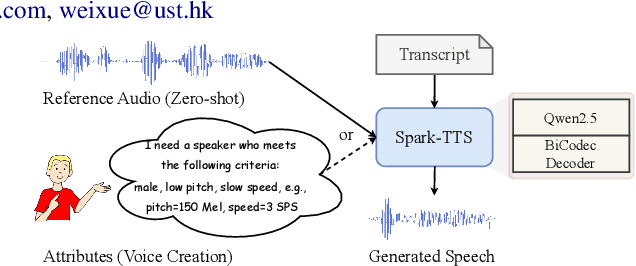Qixi Zheng
Accelerating Flow-Matching-Based Text-to-Speech via Empirically Pruned Step Sampling
May 26, 2025



Abstract:Flow-matching-based text-to-speech (TTS) models, such as Voicebox, E2 TTS, and F5-TTS, have attracted significant attention in recent years. These models require multiple sampling steps to reconstruct speech from noise, making inference speed a key challenge. Reducing the number of sampling steps can greatly improve inference efficiency. To this end, we introduce Fast F5-TTS, a training-free approach to accelerate the inference of flow-matching-based TTS models. By inspecting the sampling trajectory of F5-TTS, we identify redundant steps and propose Empirically Pruned Step Sampling (EPSS), a non-uniform time-step sampling strategy that effectively reduces the number of sampling steps. Our approach achieves a 7-step generation with an inference RTF of 0.030 on an NVIDIA RTX 3090 GPU, making it 4 times faster than the original F5-TTS while maintaining comparable performance. Furthermore, EPSS performs well on E2 TTS models, demonstrating its strong generalization ability.
Spark-TTS: An Efficient LLM-Based Text-to-Speech Model with Single-Stream Decoupled Speech Tokens
Mar 03, 2025



Abstract:Recent advancements in large language models (LLMs) have driven significant progress in zero-shot text-to-speech (TTS) synthesis. However, existing foundation models rely on multi-stage processing or complex architectures for predicting multiple codebooks, limiting efficiency and integration flexibility. To overcome these challenges, we introduce Spark-TTS, a novel system powered by BiCodec, a single-stream speech codec that decomposes speech into two complementary token types: low-bitrate semantic tokens for linguistic content and fixed-length global tokens for speaker attributes. This disentangled representation, combined with the Qwen2.5 LLM and a chain-of-thought (CoT) generation approach, enables both coarse-grained control (e.g., gender, speaking style) and fine-grained adjustments (e.g., precise pitch values, speaking rate). To facilitate research in controllable TTS, we introduce VoxBox, a meticulously curated 100,000-hour dataset with comprehensive attribute annotations. Extensive experiments demonstrate that Spark-TTS not only achieves state-of-the-art zero-shot voice cloning but also generates highly customizable voices that surpass the limitations of reference-based synthesis. Source code, pre-trained models, and audio samples are available at https://github.com/SparkAudio/Spark-TTS.
 Add to Chrome
Add to Chrome Add to Firefox
Add to Firefox Add to Edge
Add to Edge